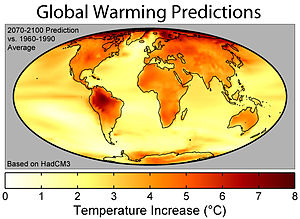Climate, Science, and “I Told You So”

- Image via Wikipedia
Many of us have grown accustomed to making sacrifices, and cut-backs, in order to save money, and energy in this economic crisis. On the plus side, for our efforts of this economic recession: Carbon dioxide pollution, dropped last year for the first time in a decade.
But, that was here in the U.S. It didn’t last long, and it wasn’t as big a drop as expected. The reasons will become clear as you read further.
We have known for 45 years,since the first Earth Day that,
burning fossil fuels to power factories, cars and airplanes, spews out greenhouse gases, that contribute to global warming. But, that hasn’t stopped us. During, this economic downturn, some factories shut down, here in the U.S., and people don’t drive or fly as much as they use to. The combination of less driving and flying, helped drop emissions about 1.3 percent from 2008 to 2009, according to a study published Sunday, in the journal Nature Geoscience. Perhaps too, maybe we have become a little more conscious, of the need to carpool.
There’s been close observation, paid to the link between gross domestic product (GDP) and pollution, in recent decades, said study lead author Pierre Friedlingstein, of the University of Exeter, in England. “The good part of the crisis, is that it reduces emissions.”
In the United States, the Energy Department said that, emissions dropped 7 percent in 2009, because of three equal factors: the slowing economy, slightly better energy efficiency, and cleaner energy. Perhaps, we were starting to pay attention, to some of our wasteful habits, too.
Worldwide, it was mostly a matter of the economy, Friedlingstein said. In 2009, the world spewed nearly 34 billion tons (about 31 billion metric tons), of carbon dioxide. That’s a drop of 453 million tons, from the previous year — what the U.S. emits in about 26 days.
The last time carbon dioxide pollution dropped, worldwide was in 1999. This was the biggest decrease since 1992, according to records by the Energy Department’s Oak Ridge National Lab. Despite last year’s improvement, worldwide carbon emissions have INCREASED, by 25 percent since the year 2000. This is because, developing nations aren’t using energy as efficiently. They weren’t as affected, by this recession, as the western world, because they are developing and catching up.
On the flip side,carbon pollution is probably already rising this year, the study authors said, and likely to set a record in 2010.
Last year, the same scientists had forecasted, almost a 3 percent drop in emissions for 2009, based on GDP projections, from the International Monetary Fund. Then, the economy improved more than expected, and developing countries, kept increasing the amount of carbon dioxide they produced, Friedlingstein said.
China’s carbon dioxide pollution jumped 8 percent, from 2008 to 2009. India’s went up about 6 percent, according to the study.
That’s part of a dramatic shift, in which countries are producing the most carbon dioxide. In 1990, the developed world produced 65 percent of the world’s carbon dioxide, said study co-author Gregg Marland, of the Oak Ridge National Lab. Now, it is less than 43 percent, as those countries have CUT about 10 percent of their emissions, while the developing world has more than DOUBLED their overall emissions.
One other bright note, is that overall carbon dioxide emissions from the destruction of forests, has slowed considerably, Friedlingstein said.
Even with a few pluses, it appears as though the world, will not reach the goal set by international negotiations, in Copenhagen last year. That goal, was to limit global warming to a 3.6 degree (2 degree Celsius) temperature increase, since industrialization began in developing countries.
While, there are still many people, who don’t believe that global warming exists, there is little doubt, according to the climate and scientific communities. The Friedlingstein study, stated that, the first 10 months of the year 2010, is tied for the hottest year, in 131 years of record keeping, according to the National Climatic Data Center. The Earth goes through cycles of warming and cooling. How else do we explain, or account, for the melting of the polar ice caps?
We are in a state of denial. At the same time, we are letting the idea of global warming, carbon emmissions, and pollution, go by the wayside, and get away from us. I don’t think, we can sit back, and say that the climate and science communities didn’t say “I told you so.” They told us 45 years ago!
What would these tools do for your business, and your POCKETS?

















